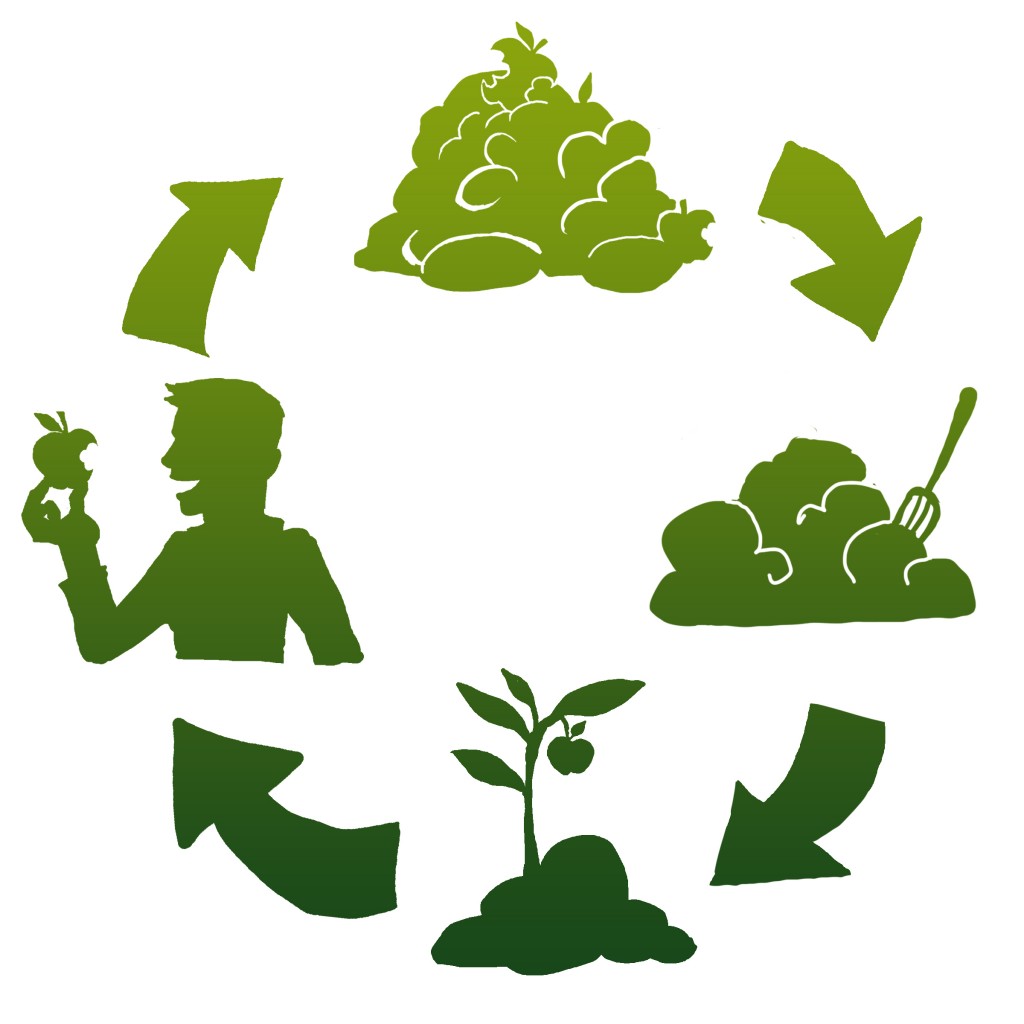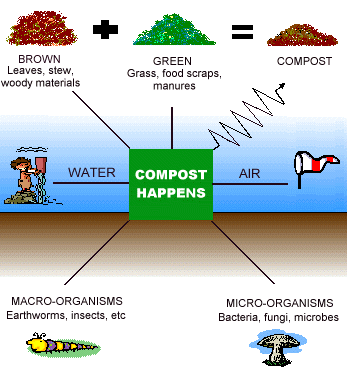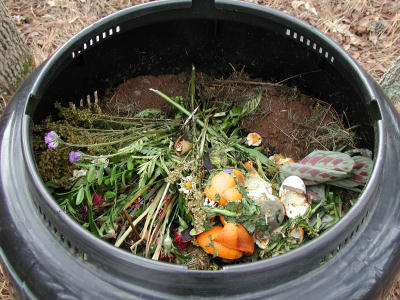Composting, Mulching & Worm Farms
Composting, mulching and worm farms are extremely satisfying ways of helping the enviornment. Making your own garden compost is a lot easier than most people realise. With a simple compost tumbler / bin you can recycle most of your organic household and garden waste and enrich your garden’s soil at the same time.
Why Compost?
How to Compost?
Making a Compost Heap
Compost Safety
Shire Rebates for Compost Bins/Tumblers
Mulching
Worm Farms
Additional Information
Why Compost?
Save Water
The water retention capacity of the soil is increased when mixed with compost. Compost improves drainage in clay soils and helps sandy soils retain water.
Save Money
Save on fertilisers and soil improvers. Compost helps retain artificial fertilisers in the soil so that they can be taken up by plants. Nutrients from compost release slowly throughout the growing season and are less easily lost by leaching than nutrients in soluble fertilisers. There is an increased ability for the soil to absorb rapid changes in acidity and alkalinity and to neutralise organic toxins produced by some plants.
Reduce Landfill & Contamination
In many areas the land allocated to waste disposal is rapidly filling up. Approximately half of all household waste is organic. Most of this waste can be recycled through composting – turning waste materials into a rich soil supplement for use in your garden.
By composting, not only can you help to reduce the amount of waste that goes into landfill but you can also help to reduce contamination and greenhouse gases.
Much of the land used for waste disposal cannot be reused in the future because of contamination. This occurs
when rubbish in landfills is compressed and the air is squeezed out. The rubbish breaks down anaerobically (without oxygen), which means that acids are produced. The acids affect other rubbish items, such as plastic, to create a toxic mix known as leachate. Leachate collects at the bottom of landfills where it then seeps into the ground water and from there into the waterways.
Improve your Garden
The rich nutrients in compost are released into the soil, as your plants need them.
- Compost assists plant growth and disease resistance.
- Compost also helps to absorb and filter runoff, protecting streams from erosion and pollution.
- Composting reduces unwanted insects, limiting the need for commercial herbicides or pesticides, therefore preventing runoff pollution.
- You won't have to bag garden waste to take it to the tip.
Greenhouse Gases
As organic waste decomposes in landfill it produces the greenhouse gases, methane and carbon dioxide. These greenhouse gases contribute to worldwide climate change.
Most landfill gas is made up of 54% methane and 40% carbon dioxide. Methane is twenty four times more damaging as a greenhouse gas than carbon dioxide. Scientists predict that climate change will impact on all our lives, especially in the areas of agriculture and human health.
How to Compost?
There are five conditions required to turn your organic waste into nutrient-rich soil. Getting the correct balance is the trick.
 Worms and Micro-organisms
Worms and Micro-organisms
These are introduced into the heap along with the raw materials. Micro- organisms include bacteria and fungi which are compost activators.
Nutrients
A lot of garden refuse is dry, brown and woody. This material tends to be high in carbon. Soft green garden waste and kitchen scraps tend to be high in nitrogen. The ideal mix is about 20 parts carbon to 1 part nitrogen.
Air
Oxygen is essential for composting. Initially your compost heap will be loosely mixed and have lots of air space. As the material settles, after two weeks or so, it is important to turn it over to re-aerate the pile. Both the micro- organism population and the temperature will fluctuate according to how regularly the pile is turned.
Water
Micro-organisms need moisture, but not too much. The moisture content of the heap should be around 50%, feeling damp but not wet. Check this each time the heap is turned.
Time
If all is well within the compost heap decay may take as little as eight to ten weeks. One of the keys to rapid and successful composting is building a big heap. The outside layer will insulate the pile and allow high temperatures to be maintained in the middle. In time, with constant turning, all parts of the pile will have been in the middle and all will be decayed.
Making a Compost Heap
There are many kinds of compost heaps from commercially available lidded bins through to larger wooden bins. Open 'heaps' are not permitted in Western Australia (under the Health Act). Contact the Shire about an approved bin or tumbler, which must be fly and vermin proof.
Bins or tumblers which have an open bottom should be sited in a warm, sunny area and in direct contact with loose soil to allow drainage, air flow and entry/exit of earthworms and micro-organisms. Earthworms contribute to efficient composting.
The first layer of the compost should be made of course material such as garden clippings, straw, dry leaves and torn newspaper (see 'What to Use' below). This will help air flow through the mix. Next add a layer of rich soil, finished compost or manure to weigh down the organic matter. This will encourage the bacteria to grow. Then start adding your kitchen and food scraps, including layers of coarse materials in between. You can even add cotton clothes. Keep the compost well watered, and remember to turn your heap every week or so. When the compost is ready to use, it will have a rich soil texture with no lumps of organic matter.
 What to Use
What to Use
Grass clippings, kitchen waste, paper wrappings, fruit and vegetable peelings, leaves, prunings (shredded), tea leaves and bags, indoor plants, coffee grounds, egg shells, manure, weeds, vacuum cleaner dust, hair and wool, cardboard, sawdust.
What NOT to use
Animal products (meat, fat, whole bones), plastic, large branches, waxy plant material, diseased plants, plant seeds, underground stems, pesticide-contamined plants, disposable nappies, cat or dog faeces.
Compost Safety
Potting mixes, mulches, composts and soils can be harmful to your health if you do not take some simple precautions. A group of organisms, called Legionella, can be found in these materials and may cause serious illness.
To help prevent infection, these simple precautions should be followed when handling such materials:
- Always wear gloves
- Keep the mix damp while in use (to avoid aerosolising and inhaling the mix)
- Avoid inhaling the mix
- Wash your hands thoroughly after use
- For more information view the information sheet Safe Handling of Potting Mixes, Mulches, Garden Soils and Composts (Preventing Legionella Infection)
A properly cared for and operated compost bin or tumbler poses little threat to health. However open compost heaps (which are illegal in WA) and poorly operated compost systems may cause health problems by encouraging breeding of flies and other pests. Unless adequate temperatures are reached within the compost the composting process can also encourage the growth of fungi and bacteria which occasionally cause respiratory complaints.
Shire Rebates for Compost Bins and Tumblers
The Shire offers a 30% Rebate for locally purchased compost bins of an approved type (one that is fly and vermin proof). Simply complete the Compost Bin Rebate Application form and submit to the Shire, together with proof of purchase and a completed Statement by Supplier. Your rebate will be processed by the Finance Department within 1- 2 weeks of receiving your application.
Mulching
Mulching is simply a very slow method of composting. It helps to reduce water loss, regulate soil temperature, prevent soil compaction and suppress weeds. To mulch, spread organic materials in a layer over the surface of the soil. Common organic materials used for mulching include wood chips, lawn clippings, compost, sawdust, straw and leaves.
Worm Farms
Worm farms provide an excellent source of nutrients for your garden. They require little attention and their by-products (castings and leachate) can improve the quality of poor soils, potting mixes and compost or be used as fertilisers. Unfortunately the hot conditions in Exmouth are not very conducive to successful worm farming, but if you would like more information please visit the Department of Agriculture or view their Wormfarms Information Sheet.
Additional Information
The information on this page has been adapted from the CleanUp Australia website
For further information on composting, mulching or worm farms please visit the following links: